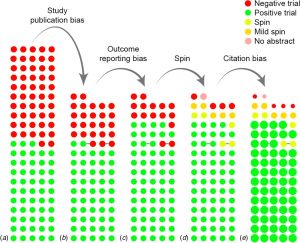This article, published Aug 2, 2018, demonstrates why it is important to have a doctor who understands evidence based medicine (EBM), the limitations of medical literature, and how to interpret study results.
I will summarize some of what the article described. This article used the case of literature on anti-depressant medications as a case study.
Here are some of their findings:

– They looked at 105 depression trials found in the FDA database – this includes trials which were not published
– Of these 105 trials, 53 demonstrated positive results and 52 negative or questionable
– All but one of the positive trials were published yet only 25 of the negative studies were (This is called Publication bias)
– 10 of the negative studies appeared as positive when published as they omitted unfavorable outcomes or switched primary and secondary outcomes (this is called outcome reporting bias).
– 5 of the remaining 15 negative studies were published with a conclusion in the abstract suggesting the treatment was effective (this is called spin)
– The trials that gave positive results were cited by future articles 3 times more often than those which were negative (this is called citation bias)
Take aways:
– There is always more to the story. This explains why we so often we see headlines on medical news which either do not pan out, are incorrect, or are later reversed.
– It is important to understand that despite our excellent scientific methods, biases and errors are still prevalent. We should be cautious with conclusions we read, appropriately critical of methods, and be open and willing to accept new ideas that might conflict with prevailing consensus.
– After reading this write-up, if you are taking an anti-depressant, DO NOT STOP just because of what you read here. These medicines do work – there is just more nuance to science than is always apparent.



